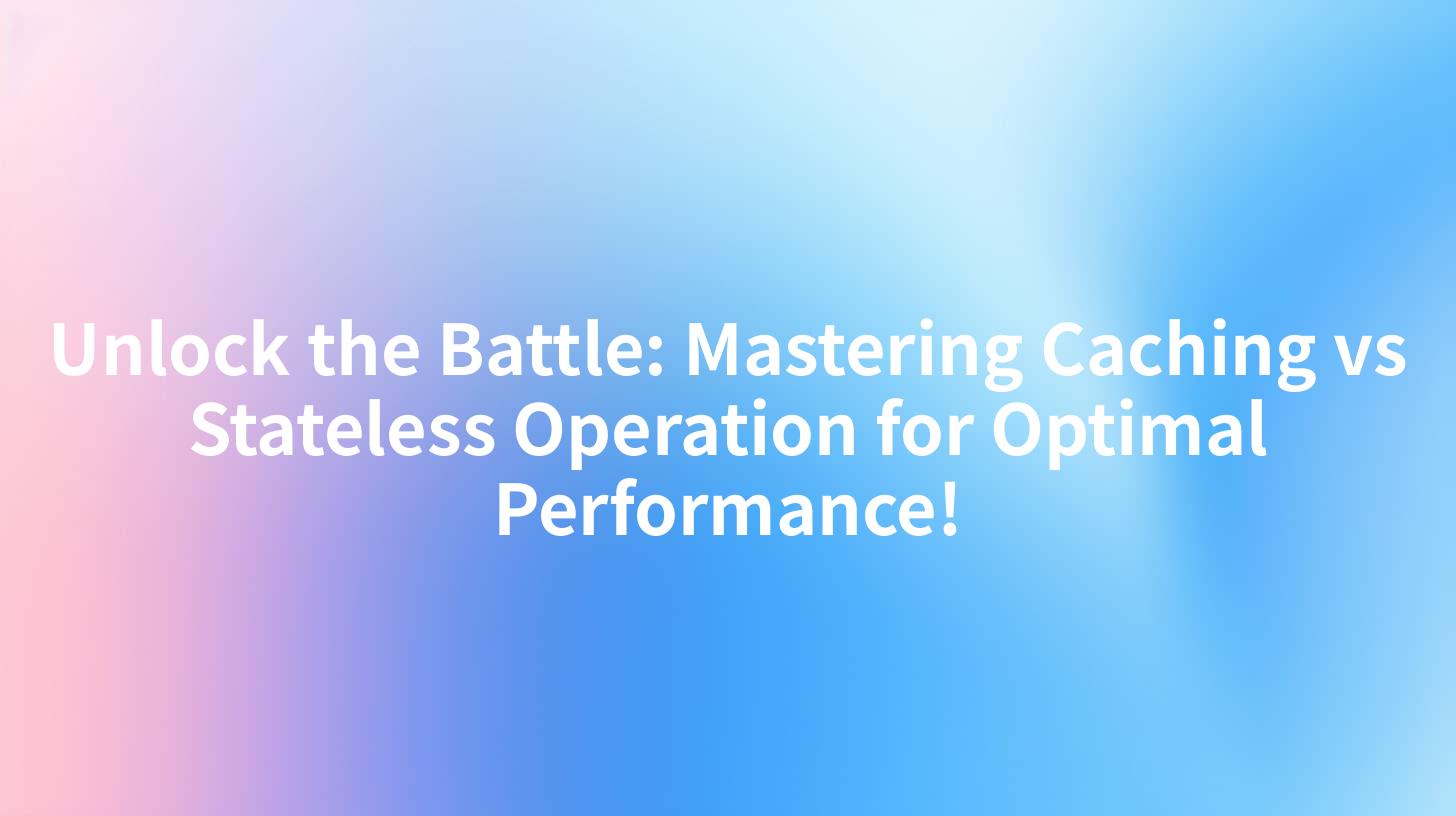Unlock the Battle: Mastering Caching vs Stateless Operation for Optimal Performance!

In the world of API development, the choice between caching and stateless operation is akin to a high-stakes battle. Both strategies offer unique advantages and potential drawbacks, and mastering their nuances is crucial for achieving optimal performance. This article delves into the intricacies of caching and stateless operation, their implications for API performance, and how to leverage the strengths of each approach. We will also explore how APIPark, an open-source AI gateway and API management platform, can aid in this optimization process.
Introduction to Caching
Caching is a fundamental technique used to improve the performance of APIs by storing frequently accessed data in memory. This reduces the need to fetch data from the original source, such as a database, each time it is requested. The primary benefits of caching include:
- Reduced Latency: By retrieving data from memory instead of the database, caching can significantly reduce the latency of API responses.
- Increased Throughput: Caching allows APIs to handle more requests per second, as the processing time is reduced.
- Improved User Experience: Faster response times lead to a better user experience.
However, caching also comes with challenges, such as cache invalidation and synchronization issues. When data changes, cached copies must be updated or invalidated to maintain data consistency.
The Power of Stateless Operation
Stateless operation refers to the design principle of not storing any client-specific information on the server. Each request is treated independently, and the server does not maintain any state between requests. The key benefits of stateless operation include:
- Scalability: Stateless systems can be easily scaled horizontally by adding more instances of the application.
- Reliability: Since there is no shared state, a single instance failure does not affect the entire system.
- Simplicity: Stateless systems are often easier to design and maintain.
However, stateless operation also has its downsides, such as the need for external data sources to maintain state information and the potential for increased latency due to repeated data fetching.
APIPark is a high-performance AI gateway that allows you to securely access the most comprehensive LLM APIs globally on the APIPark platform, including OpenAI, Anthropic, Mistral, Llama2, Google Gemini, and more.Try APIPark now! 👇👇👇
Caching vs Stateless Operation: A Comparative Analysis
To determine the most suitable approach for a given API, it is essential to compare the benefits and drawbacks of caching and stateless operation. The following table summarizes the key differences between the two strategies:
| Aspect | Caching | Stateless Operation |
|---|---|---|
| Performance | Improved response times, reduced latency, increased throughput | Improved scalability, reliability, and simplicity |
| Complexity | More complex due to cache management and synchronization issues | Simpler to design and maintain, but may require external data sources for state management |
| Scalability | Limited scalability due to cache synchronization issues | Highly scalable, as new instances can be added without affecting existing ones |
| Reliability | Can be less reliable due to cache consistency issues | Highly reliable, as there is no shared state |
| Data Consistency | Requires careful management to ensure data consistency | Typically more consistent, as data is fetched from a single source each time |
Leveraging APIPark for Optimal Performance
When it comes to optimizing API performance, APIPark can be a valuable tool. As an open-source AI gateway and API management platform, APIPark offers several features that can help developers make informed decisions about caching and stateless operation:
- API Gateway: APIPark provides an API gateway that can route requests to the appropriate service and manage caching and stateless operation.
- API Management: The platform offers comprehensive API management capabilities, including API design, publication, invocation, and decommission.
- Monitoring: APIPark includes monitoring tools that can help identify performance bottlenecks and optimize caching and stateless operation strategies.
By using APIPark, developers can:
- Implement Caching: APIPark can be configured to cache frequently accessed data, reducing latency and improving throughput.
- Ensure Stateless Operation: The platform supports stateless operation by routing requests to the appropriate service without maintaining any client-specific state.
Conclusion
Choosing between caching and stateless operation is a crucial decision in API development. Both strategies offer unique benefits and drawbacks, and the best approach depends on the specific requirements of the API. By leveraging the features of APIPark, developers can optimize their APIs for optimal performance, ensuring a better user experience and a more scalable, reliable system.
FAQs
- What is the primary benefit of caching in API development?
- The primary benefit of caching in API development is reduced latency, as frequently accessed data is stored in memory, allowing for faster response times.
- How does stateless operation contribute to API performance?
- Stateless operation contributes to API performance by improving scalability and reliability, as new instances can be added without affecting existing ones.
- What are some challenges associated with caching?
- Some challenges associated with caching include cache invalidation and synchronization issues, which can lead to data inconsistency.
- Why is stateless operation considered more scalable?
- Stateless operation is considered more scalable because new instances can be added without affecting existing ones, allowing for horizontal scaling.
- How can APIPark help optimize API performance?
- APIPark can help optimize API performance by providing an API gateway, API management, and monitoring tools that can be used to implement caching and stateless operation strategies.
🚀You can securely and efficiently call the OpenAI API on APIPark in just two steps:
Step 1: Deploy the APIPark AI gateway in 5 minutes.
APIPark is developed based on Golang, offering strong product performance and low development and maintenance costs. You can deploy APIPark with a single command line.
curl -sSO https://download.apipark.com/install/quick-start.sh; bash quick-start.sh

In my experience, you can see the successful deployment interface within 5 to 10 minutes. Then, you can log in to APIPark using your account.

Step 2: Call the OpenAI API.

